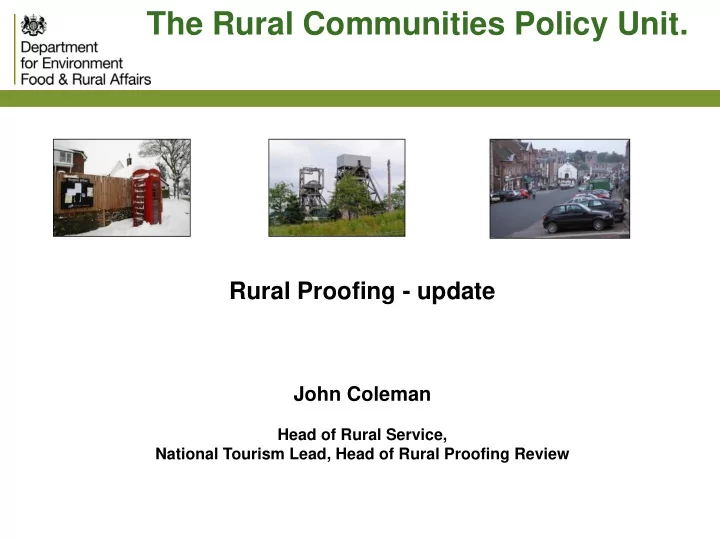

The Rural Communities Policy Unit. Rural Proofing - update John Coleman Head of Rural Service, National Tourism Lead, Head of Rural Proofing Review
Our approach to rural proofing ... • Defra Ministers lead and champion rural policy across Government • Rural policy functions within Defra - Rural Communities Policy Unit (RCPU) – Centre of rural expertise • A shift at the way we look at rural England – sustainable growth - unlocking rural potential • While retaining a focus on securing fair, efficient and affordable outcomes for rural communities • Ultimately – our end game is mainstreaming, not special consideration.
Four core drivers to our rural proofing • Structured dialogue to share national to local policy perspectives, opportunities and challenges Advocacy • Research projects are jointly funded (across Government) and collaborative in nature. • More transparent : Impact Assessments and annual reports and accounts – all now include rural Scrutiny Evidence proofing assessments. • Scrutiny: Efra Select Committee continue to take a real interest in our work. But we are going further… Open • A Rural Proofing Implementation and review within government is now Transparent underway, • Led by Lord Cameron of Dillington, a former rural advocate
The Rural proofing review Initial observations …. • Generally, good awareness of rural proofing responsibilities at senior levels within departments, although not always • A clear appetite to understand more about what departments can and should be doing in relation to rural proofing – with Defra’s support • Not unsurprisingly, there are differing ways in which rural proofing practices and principles are being applied • Rural proofing benefits from inter-departmental co- operation and coordination • Localism means there is an imperative for local level rural proofing to play its part
The Rural Proofing review • Improvements to the IA Guidance with workshops to improve assessment of policy impacts before policies come to write round • Improvements to departments’ knowledge and skills in relation to rural issues, including facilitated workshops from RCPU • Improved use of rural data sets, and better understanding of rural challenges • Finding ways to overcome the ‘tick box’ culture in departments which has led to the lack of understanding identified in the review. For example, can the cabinet write round processes help here? • It would encourage evidence on rural impacts to be mainstreamed early and would foster transparent discussion on rural proofing eg for the departmental annual reports, accounts and impact assessments. • But , getting the systems right at the start of the policy making cycle is more feasible and helpful
Rural Proofing and Health. Martin Gorringe Rural Services Team
Why Rural Proof Health? • Positive health outcomes for rural areas = health equity • Significant inequalities around access to services • Access to GP’s - • Travel distance – acute centres and specialist treatment = further away • Distance decay – patients access services less the further away they are. • Cost of service provision – Community care, economies of scale, staff retention
Why Rural Proof Health? • 80% of rural residents live within 4km of a GP Surgery, compared with 98% of urban population • 57% of rural residents live within 4km of an NHS Dentist, compared with 98% of urban population • Around one-sixth of Primary Care Trusts (PCTs) with the worst health and deprivation indicators were located in rural or significantly rural areas. • www.defra.gov.uk/statistics/rural • www.gov.uk/government/publications/national-rural-proofing-guidelines
Rural Proofing for Health Toolkit
Recommend
More recommend